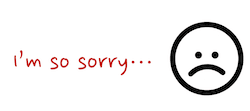In a BBC report a few months ago, journalist Jackie Leonard (one of my favourites) chronicled a number of high-profile celebrities who were forced to apologise in 2016. Mixed in with the embarrassment, social media harassment and potential damage to sales, sorry is the hardest word, especially for the “high and mighty.”
Stars saying sorry
Here are some of the cases that Ms Leonard cited:
 Jennifer Lawrence – on the Graham Norton show, scratching her backside on sacred rocks (in Hawaii). Ms Lawrence said, “I understand the way it was perceived was not funny. I apologise if I offended anyone…”
Jennifer Lawrence – on the Graham Norton show, scratching her backside on sacred rocks (in Hawaii). Ms Lawrence said, “I understand the way it was perceived was not funny. I apologise if I offended anyone…”- Billy Bush (radio host) got snared talking trash with Donald Trump. Bush said, “It’s no excuse but this happened 11 years ago…”
- Ryan Lochte (Olympian swimmer) said after his shameful hoax in Brazil: “I am taking full responsibility for it. … I over-exaggerated…”
- Lin “Super” Dan (badminton star in China) was discovered for having an affair when his wife was pregnant
- Bollywood actress Priyanka Chopra, was on Conde Nast’s Traveller magazine front cover with the words “migrant refugee outside” crossed out; but the word traveller remained, as if being a refugee were an option.
- Justin Bieber, after storming off stage in Manchester in mid song, felt compelled to write a letter of apology (here’s the letter via HypeBeast). But, no sooner had he tweeted it out, he then deleted the tweet and the letter. Half sorry?
- Johnny Depp and then-wife Amber Heard had to go on air to say they were “truly sorry” for sneaking their dogs into Australia on their private plane. The output: the hashtag #waronterrior
Every element is scrutinized: the way you apologise, how quickly you do it, on which platform, the way you justify your action, the tone, etc. Meanwhile, when Patti Smith sang in Bob Dylan’s place for the reception of his Nobel peace prize, in mid-song, “A Hard Rain’s Gonna Fall,” she had to stop. She issued a heartfelt “Sorry, sorry, I’m sorry… I apologise.” As BBC journalist, Vincent Dowd said, “I saw it and I thought it was wonderful. … Utterly human and moving.”
The effects of transparency
In a world where it’s increasingly easy to see “inside” a company (cf transparency), businesses and business leaders are regularly going to be confronted with their failings by a clamouring public and media of all forms. It is my conviction that, not only will leaders need to learn how to say sorry more often, it will be one of the most powerful ways for businesses to humanise and render themselves more credible, if not more authentic. It’s as if sorry is the consequence -- and perhaps antidote -- for transparency. Share on X The problem, of course, is that “sorry” is a difficult word to utter for many (overly proud) leaders, as it is an avowal of some kind of failure. However you choose to manage that “sorry” will be quickly judged by social media. In many regards, the good news is that the storm will typically blow over. However, no sorry or a bad sorry can still be costly to image.
Sorry is the hardest word
Just as “sorry” may be one of the saving graces of relationships, it is also a powerful concept which few leaders know how to express. In the past, in times of crisis, PR teams would surround the CEO and try to “manage” the narrative, carefully crafting press releases that put the bad news in as best a light as possible. Too often, however, the public response is late and/or stiff, and the BS detector reads off the chart. If the way contrite Japanese business leaders profusely apologise seems a little too OTT and ceremonial, I think business leaders should better get used to learning how to say sorry in a genuine manner. It's just going to be a matter of time before some or other sloppy or ethically questionable action is going to be brought to light. Share on X In which case, it will be necessary to bring your A(uthentic) game to the table and utter a heartfelt sorry. If you are able to say sorry well, you might even gain in credit and humanity if done well. Share on X
—
Featured image courtesy of HypeBeast


 Jennifer Lawrence – on the Graham Norton show, scratching her backside on sacred rocks (in Hawaii). Ms Lawrence said, “
Jennifer Lawrence – on the Graham Norton show, scratching her backside on sacred rocks (in Hawaii). Ms Lawrence said, “








